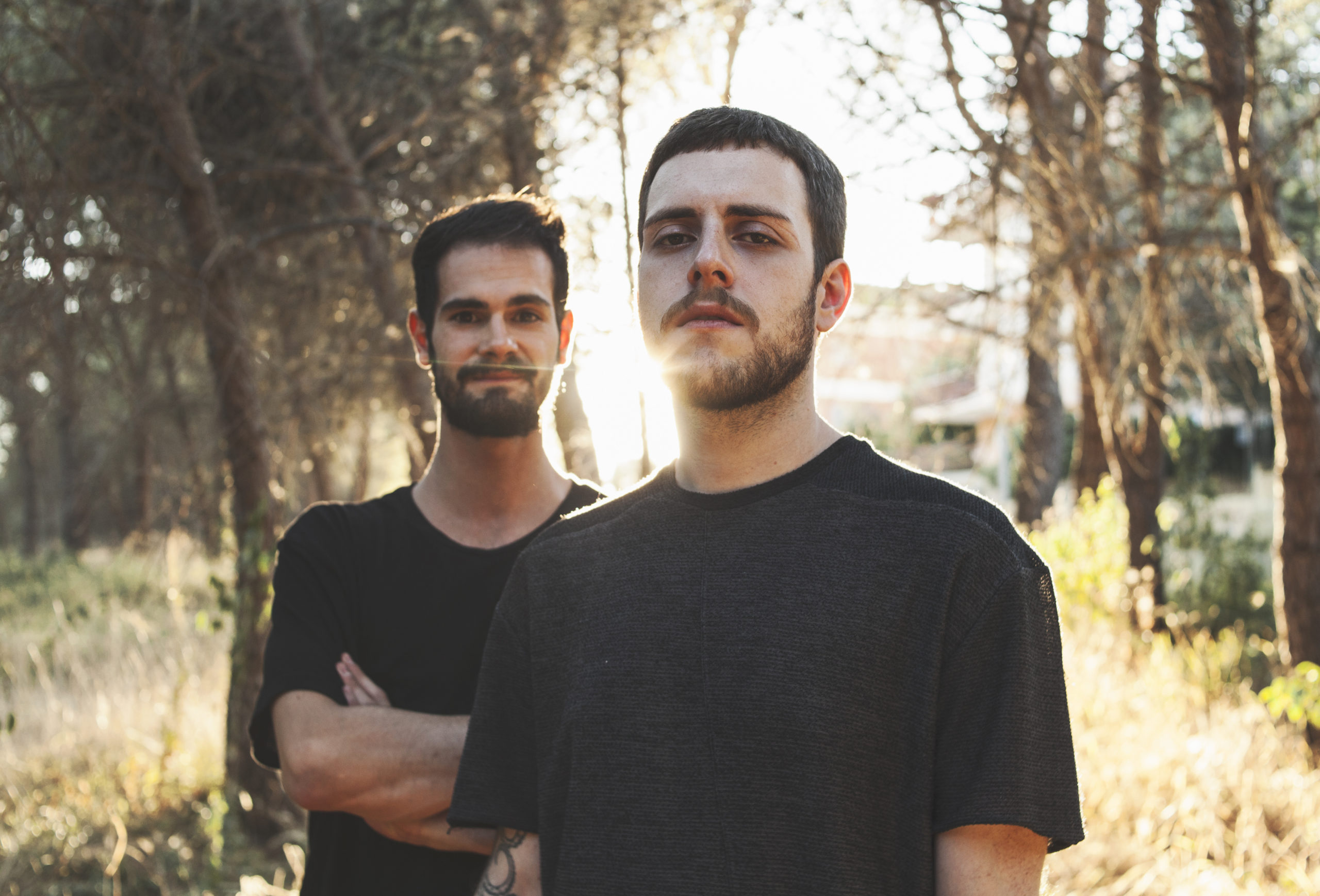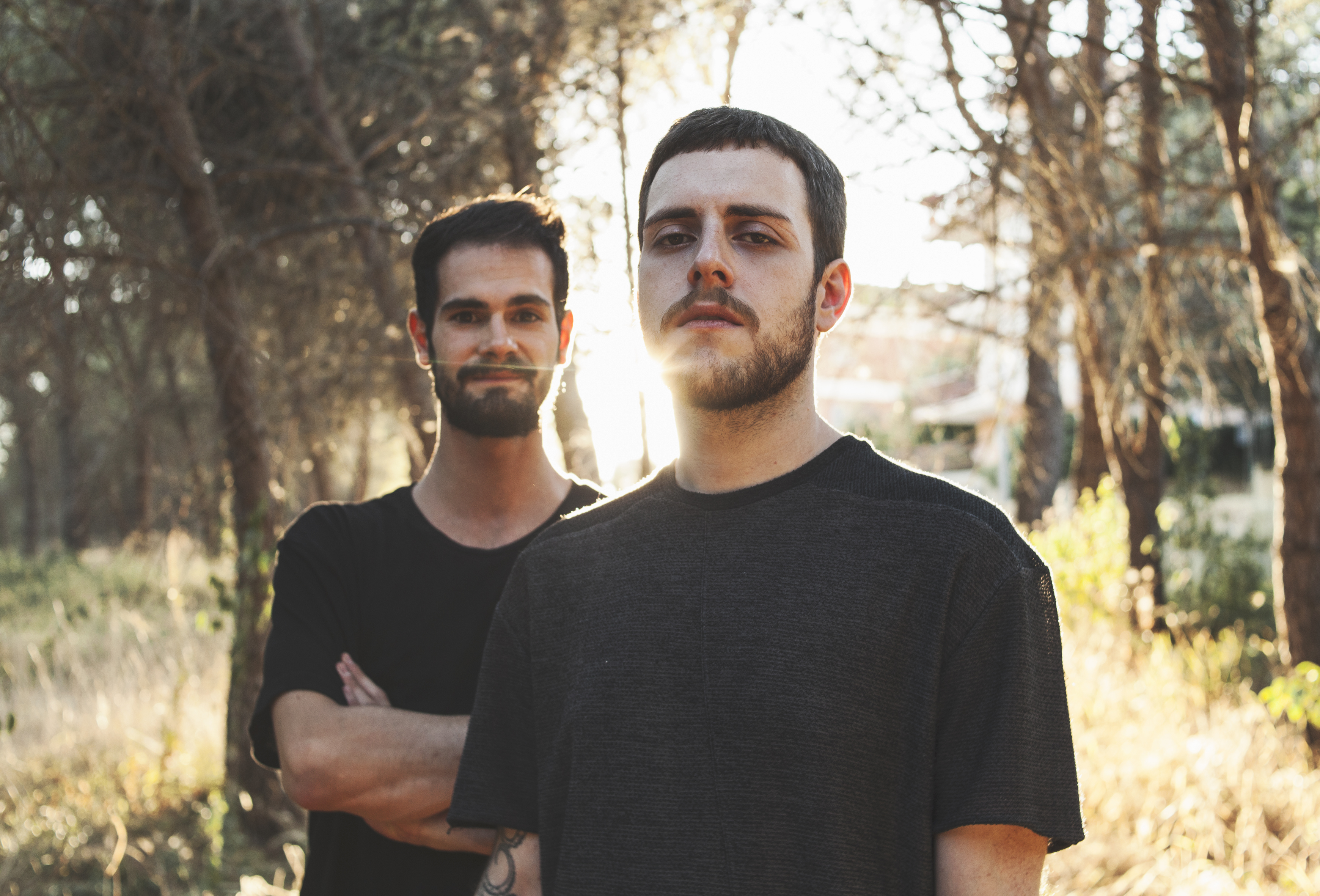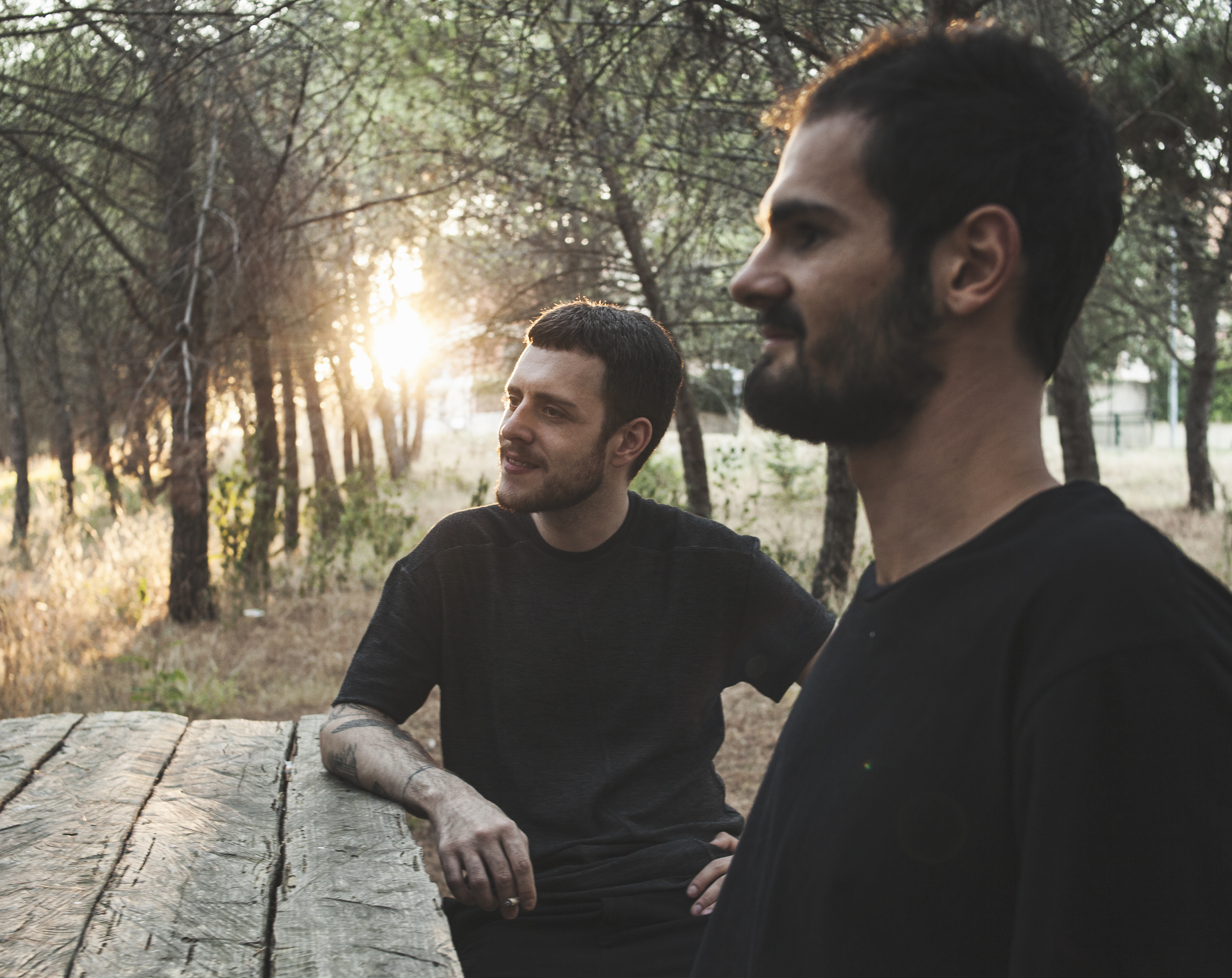Bubblin’ Up: Late Night Approach
XLR8R catches up with the rising Italian duo.

Bubblin’ Up: Late Night Approach
XLR8R catches up with the rising Italian duo.

You’ve probably never heard of Late Night Approach. The project, that of 25-year-old Domenico and 23-year-old Giuseppe, only started recently and has only one release to its name: “Poison Valley,” a late night electro cut that surfaced on Steffi‘s fabric 94 mix before release on the Panorama Bar resident’s Dolly Deluxe sub-label. Until now, there was absolutely nothing more to be found on them.
Domenic and Giuseppe grew up in Italy’s Matera, a “desert” when it comes to club culture, they explain. “It’s one of the most ancient cities in the world,” they stress, and is a known cultural destination. This context—this art and history that surrounded them—inspired them to do music to “export” as a local product, while they also began an underground rave series where they tried to “add value to the awesome and abandoned venues all around the city.” It was these events, titled Excepta, that inspired XCPT, their collaborative label that bears “no real connection” to the Late Night Approach project.
Nowadays, the pair are based in Milan, where Giuseppe studies while Domenico works as a Graphic Designer—and they fit musical production in when and where they can. Both currently have solo projects—Giuseppe as Delikwe; Domenica as Nothus—but the Late Night Approach project was born out of a spontaneous studio jam some years ago. It has since become their “personal collective dimension,” and their next release comes in the form of an electro-tinged four-tracker on Steffi’s Klakson label, scheduled to land later this year.
To learn more, XLR8R caught up with Italian duo, whom also offered up a studio mix to showcase their sound—included within are two tracks from the Klakson EP. Grab the mix at the bottom now.
So, not much is known about you guys. Introduce yourselves—who are you, and where are you from?
D: Hi guys, thank you so much for this opportunity! I’m Domenico, the anxious half of this duo, a graphic designer proudly from Matera, South of Italy. Actually, I’m living in Milan now.
G: Hello everyone, my names is Giuseppe and I’m currently attending a Music Computer Science course at the University in Milan and, of course, doing music at late night.
You move to London from Matera, right, and now you both now live in Milan. What took you both there?
G: The main reason was seeking fresh inputs professionally speaking; this experience deeply shaped our being in the last few years in terms of visions and knowledge. We both come back recently to Milan probably because we felt the need to charge our batteries before another step forward.
So you both have full-time projects on the side, studying or work. How do you find the time to do music?
D: Well it’s the hardest part of doing music because it’s not just a matter of time but mainly about focus, and the fact that we’re not strict with our schedule doesn’t help us at all. Long sessions during the weekends and daily small doses of studio time are a good compromise.
How did you guys meet?
D: We met almost a decade ago in our hometown and, despite the different musical backgrounds, our friendship became deep and real thanks to music in all its shapes and extensions.
G: Yes, extensions because of course, it’s not all about creating, listening, and playing music. We’re so happy about all the experiences we had and we will have thanks to electronic music and so proud to have found friends and colleagues at the clubs, I mean this is the most amazing thing of the scene.
“Every record reminds me of something that happened during the period I bought it so it’s somehow my recent intimate collection of moments.”
What was your path into music?
D: Music has been my muse since early days, although I didn’t have formal music studies. I started collecting records probably 10 years ago so I must say it led me to have a tangible affection to it. Every record reminds me of something that happened during the period I bought it so it’s somehow my recent intimate collection of moments.
Hardware programming and post-production have been something I really love to spend time on.
G: As a teenager, I was dancing in a breakdance crew so I grew up with that sort of influence, then my musical taste has been fully based on hip-hop and breaks. But I must probably say that drone was already bringing me into electronic music since the early days.
What’s the story behind the name Late Night Approach?
D: Late Night Approach started in London a few years ago but actually, I cannot remember specifically when. We began spontaneously recording for fun some music that probably would never be released, I think it was a direct influence by the records we used to buy at the time.
G: At the time our job schedules forced us to concentrate our musical energies at late night, sometimes early morning. We are really grateful for the upstairs neighbors even though we never met them.
You produce as a duo, but do you DJ as a duo too?
D. Actually, we play and produce solo and together, it basically depends on the vibe of the session and on the material we’re working on, but it’s true that Late Night Approach is strictly collective and has its specific “aura,” so yes! Everything is done together, studio and DJing-wise.
But we still have our solo projects that we recently started with our label XCPT.
G. I think that having our own platform gives us (and will, I hope) freedom to develop our solo projects too; at the moment as Delikwe I’m really influenced by ’90s techno and broken patterns, Domenico (Nothus) is probably more on IDM and kind of jungle; but still even in that there’s a lot of sharing and exchange of critics. Late Night Approach is our personal collective dimension, so somehow we “feel” where to drive the spaceship while we’re producing or mixing.
So you both have solo projects, too, and the label.
D. XCPT and Excepta are the real soul behind a revenge we needed to fight for. Matera, that is represented in all the B-sides of XCPT, is the main core of the label, visually and musically speaking. At a certain point, we felt it was the time to showcase our sound with the people we love, at home. So that’s where Excepta comes from, a crew of few guys organizing raves with a secret location policy, inviting as guests those artists involved in the label project and close friends to play for our city. The label instead is the sound metaphor built up on this rave series so somehow each record tells a moment lived in.
At the moment, we have just released two records, first one it’s me as Nothus with a remix by Andrea who did an insane live performance last year. The second one, it’s me and Giuseppe as Nothus & Delikwe including remixes by MGUN and DJ Plant Texture who played in Matera last April, probably was the most intense party we had. As you can see we did a record still together but with our solo pseudonym so it’s just a different output
How would you describe your sound?
D. At the moment we’re really into electro and some sort of dreamy electronic landscapes that sometimes I cannot define with a genre.
G. Yes, there’s a strong Influence by Detroit early techno and house too. The main aim is let this music be danced by robots in the future

Your first release came earlier this year on Steffi’s Fabric94 where you provided “Poison Valley.” Where did your relationship with Steffi begin? How did you meet?
D. It all started with an e-mail in late 2015. We sent some of the first tracks recorded in London and were not so electro saying the truth. Then, I met her at a party, in a lovely church in Hackney, and then everything flowed spontaneously.
Talk to me about the production behind this track: was it made especially for Steffi, and what was the process behind?
G. Yes it was and actually was arranged in our hometown, that’s why it is dedicated to it. All the drums sounds come from my MPC and some drum machines. The bassline was sequenced and the rest is mostly played live by Domenico. That track means a lot to us, we really felt glad to be in this Fabric mix for first because Steffi asked us to prepare something for this historical club, where we have had some great times. The whole compilation is simply outstanding.
You say that “Poison Valley” is dedicated to your home town. What does the name mean?
D: Matera is an idyllic white-stone town surrounded by nature. it’s the quietest and wonderful place on earth famous for its warm welcome with guests but still… poisoned by ignorance and envy.
Had you produced lots of music before this track?
D: Actually yes, but we just started releasing recently. There’s a lot of research and experiments behind it and this means, of course, a lot of time. It’s personally quite hard to me to realize that a track is fully finished, it’s a sort of personal disease called perfectionism !
G: We spent lots of time on gears and software and did many tracks actually but especially, in the beginning, we didn’t want to put any boundaries. I think we realized one day that was the right moment to send a demo.
Did the early Late Night Approach tracks sound different to Poison Valley?
D: Yes, I think they were not so electro oriented but their pulsating heart was the same, our setup too; we will probably release one of those tracks, let’s see!
You can hear techno and electro in your music. To what extent is dance music an influence?
D. We really like club culture overall so this has been our main path to knowing new artists. Second-hand record shops and Discogs definitely helped us to discover music from the past and this is where our main influence comes from.
G. London has been fundamental for me to discover the story behind ’90s underground music. This because there’s a tangible link to that culture pressed on wax, record stores full of beauties that just need to be found in the dust. We lived our years in the UK with our amazing flatmate Nicky and this guy was a proper guide to me for what concerns labels and music history back in days.
“It’s a sort of an electro renaissance.”
Do you feel that electro is coming back again?
D. Yes is definitely back and we cannot be happier about it. It’s a sort of an electro renaissance.
G. Honestly I’m not really into the modern scene but it’s definitely more usual to hear electro tunes in clubs today.
What’s your typical way of recording?
D. Depends on the moment basically. We usually record tracks by hardware in one take to catch the vibe but most of the times we process all the sounds with software. There’s not really a precise scheme behind the production, we chose which synth or plug in to use to reach a certain sound.
G. The Akai MPC 1000 is the first gear I bought so I achieved a sort of method using it instead of Domenico that is more into Elektron gears. It’s basically everything sequenced a part of leads or strings that are usually recorded live.
You’re soon set to release a four-track EP on Klakson — Steffi’s label. How did this come about?
D. We have a really open professional relation with Steffi and we��re so grateful to her for having a respectful approach with our music and support since the beginning. It made us free to express ourselves and conscious of what we’re doing and this helped us to work on the right direction for this EP. We really cannot wait to have this record in our hands!
What’s up next after the EP?
G. Currently as Late Night Approach we’ve something under the knife that hopefully will see the light soon! Fingers crossed!

